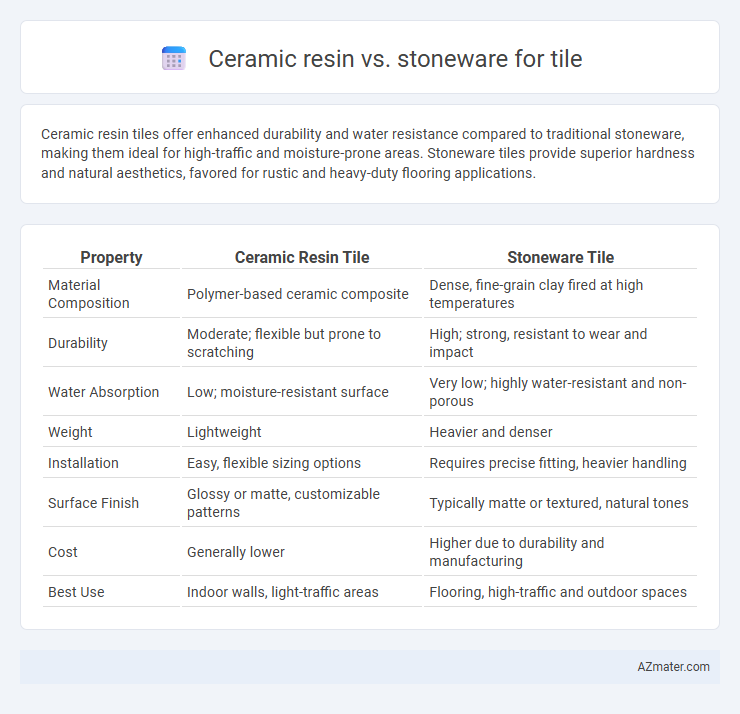Ceramic resin tiles offer enhanced durability and water resistance compared to traditional stoneware, making them ideal for high-traffic and moisture-prone areas. Stoneware tiles provide superior hardness and natural aesthetics, favored for rustic and heavy-duty flooring applications.
Table of Comparison
| Property | Ceramic Resin Tile | Stoneware Tile |
|---|---|---|
| Material Composition | Polymer-based ceramic composite | Dense, fine-grain clay fired at high temperatures |
| Durability | Moderate; flexible but prone to scratching | High; strong, resistant to wear and impact |
| Water Absorption | Low; moisture-resistant surface | Very low; highly water-resistant and non-porous |
| Weight | Lightweight | Heavier and denser |
| Installation | Easy, flexible sizing options | Requires precise fitting, heavier handling |
| Surface Finish | Glossy or matte, customizable patterns | Typically matte or textured, natural tones |
| Cost | Generally lower | Higher due to durability and manufacturing |
| Best Use | Indoor walls, light-traffic areas | Flooring, high-traffic and outdoor spaces |
Introduction to Ceramic Resin and Stoneware Tiles
Ceramic resin tiles are crafted from a blend of ceramic materials and resin, offering enhanced durability and flexibility for various flooring and wall applications. Stoneware tiles, made from high-fired clay, are denser and more water-resistant, making them ideal for high-traffic or moisture-prone areas. Both types provide distinct aesthetic and functional benefits, with ceramic resin tiles excelling in design versatility and stoneware tiles delivering superior strength and longevity.
Composition and Manufacturing Processes
Ceramic resin tiles are composed of a mixture of clay, resin, and other synthetic materials, which are molded under lower temperatures to create a lighter and more flexible tile. Stoneware tiles are made from dense clay fired at higher temperatures, resulting in a harder, more durable product with a naturally textured surface. The manufacturing process for ceramic resin involves resin bonding and molding, while stoneware undergoes high-temperature firing and vitrification, enhancing its strength and water resistance.
Durability and Strength Comparison
Ceramic resin tiles offer enhanced flexibility and impact resistance but generally have lower hardness compared to stoneware tiles, which are denser and exhibit superior durability and strength under heavy foot traffic. Stoneware's high firing temperature results in a harder, more robust surface that resists chipping, scratching, and abrasion better than ceramic resin options. For high-traffic areas or commercial settings requiring maximum longevity, stoneware tiles provide a more resilient and long-lasting flooring solution.
Design Versatility and Aesthetic Appeal
Ceramic resin tiles offer exceptional design versatility with their ability to mimic natural materials, intricate patterns, and vibrant colors, making them ideal for contemporary and customizable aesthetics. Stoneware tiles provide a more rustic and organic appeal due to their textured surface and earthy tones, enhancing spaces with a natural, timeless look. Both materials cater to different design preferences, where ceramic resin excels in precision and variety, while stoneware emphasizes authenticity and durability.
Water and Stain Resistance
Ceramic resin tiles exhibit moderate water resistance due to their dense, non-porous surface but may require sealing to enhance stain protection in high-traffic areas. Stoneware tiles, characterized by their durable vitrified composition, offer superior water resistance and naturally repel stains without extensive maintenance. Both materials provide effective solutions for moisture-prone environments, with stoneware generally outperforming ceramic resin in long-term durability and stain resistance.
Installation Methods and Considerations
Ceramic resin tiles typically offer easier installation due to their lightweight nature and compatibility with various adhesives, making them ideal for DIY projects and less labor-intensive settings. Stoneware tiles, being denser and heavier, require more robust mortar and careful substrate preparation to ensure long-term durability and prevent cracking under stress. Proper surface leveling and moisture control are critical for both materials, but stoneware demands stricter adherence to these conditions to maintain installation integrity over time.
Maintenance and Longevity
Ceramic resin tiles offer enhanced durability and stain resistance, making maintenance relatively simple with regular cleaning and occasional sealing to prevent surface wear. Stoneware tiles, known for their dense composition, exhibit excellent longevity and resistance to chipping, but may require periodic sealing to protect against moisture and staining in high-traffic areas. Both materials demand routine upkeep; however, stoneware typically provides superior lifespan in heavy-use environments, while ceramic resin balances ease of care with long-term performance.
Cost Differences and Value
Ceramic resin tiles tend to be more affordable than stoneware, making them a cost-effective choice for budget-conscious projects. While stoneware offers superior durability and resistance to wear, its higher price reflects enhanced long-term value, especially in high-traffic areas. Investing in stoneware can reduce maintenance and replacement expenses over time, balancing upfront costs with longevity.
Environmental Impact and Sustainability
Ceramic resin tiles often contain synthetic polymers and may involve energy-intensive manufacturing processes, leading to higher carbon emissions compared to stoneware tiles. Stoneware is made from natural clay baked at high temperatures, offering better biodegradability and lower environmental toxicity throughout its lifecycle. The use of stoneware promotes sustainability by utilizing abundant natural materials and supporting recycling efforts in construction waste management.
Choosing the Best Tile Material for Your Project
Ceramic resin tiles offer lightweight durability and versatile designs, making them ideal for indoor applications requiring easy installation and moisture resistance. Stoneware tiles provide superior hardness, natural texture, and enhanced scratch resistance suited for high-traffic areas and outdoor use. Selecting the best tile material depends on project-specific needs like location, durability requirements, and aesthetic preference.

Infographic: Ceramic resin vs Stoneware for Tile
 azmater.com
azmater.com